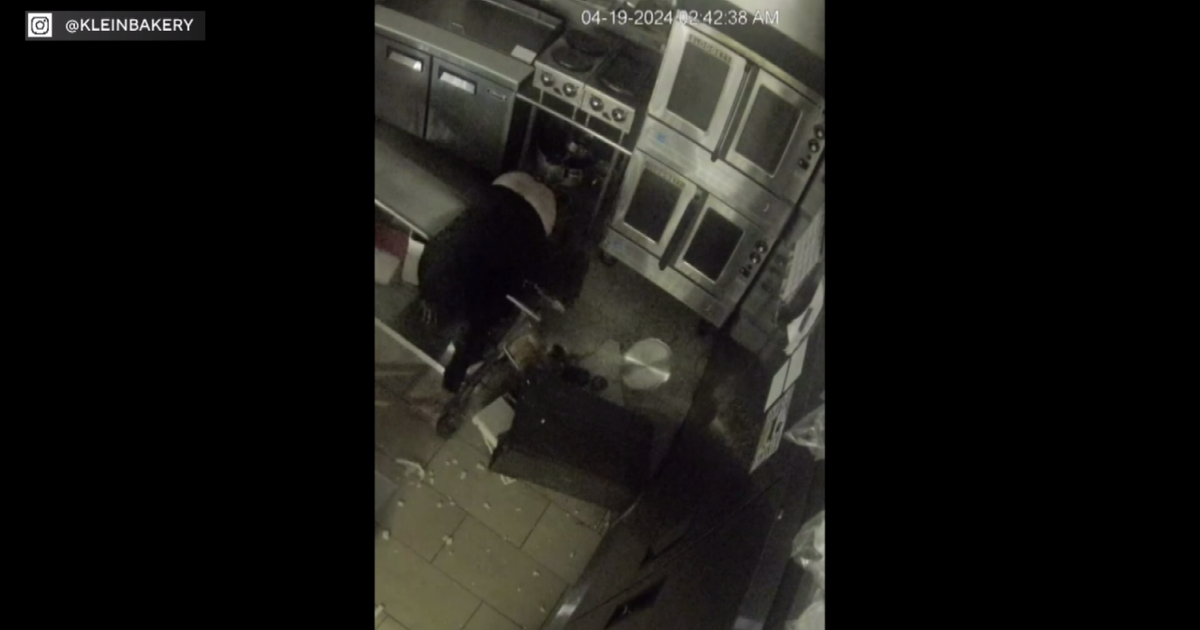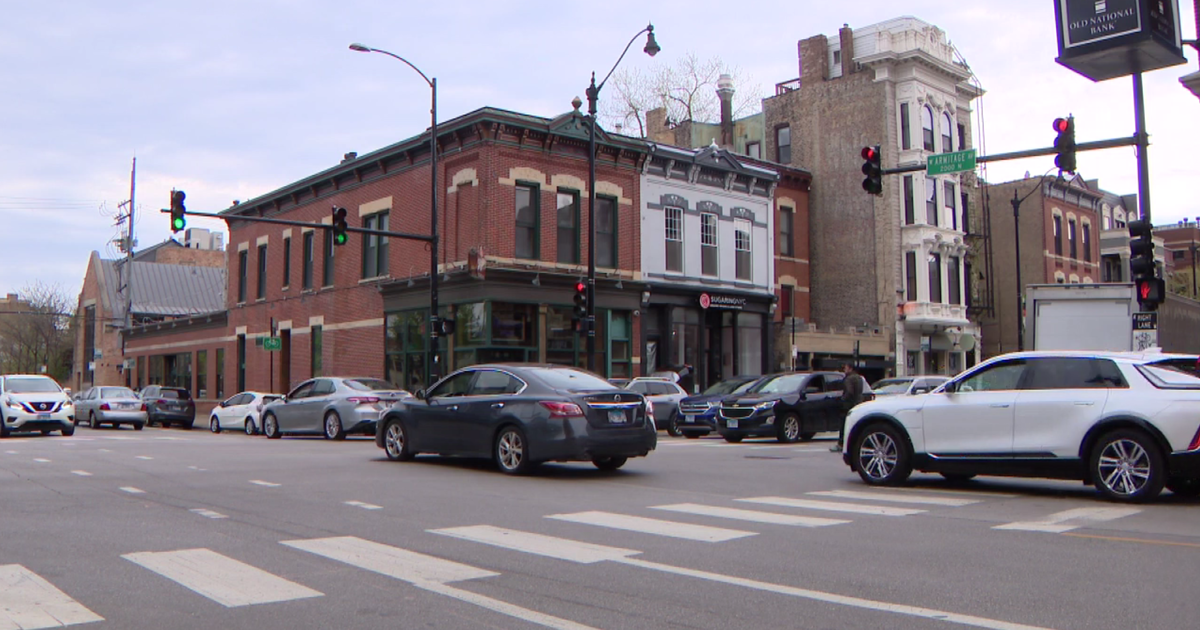Judge: Blago Lawyer's Questions 'Out Of Bounds'
UPDATED 05/09/11 6:43 p.m.
CHICAGO (CBS) -- A defense attorney for Rod Blagojevich drew some harsh criticism from the judge at the former governor's corruption retrial on Monday for repeatedly asking questions that the judge had already ruled were "out of bounds."
Blagojevich's defense team got their first chance to poke holes in the prosecution's case that the former governor was trying to sell or trade an appointment to the U.S. Senate seat vacated by President Barack Obama in 2008, but prosecutors objected more than 150 times to the questions from the defense.
Attorney Aaron Goldstein was questioning two key witnesses on the Senate seat allegations on Monday: former Blagojevich chief of staff John Harris and union leader Tom Balanoff.
U.S. District Judge James B. Zagel sustained dozens of objections from prosecutors, often because Goldstein was trying to make arguments in the form of questions.
In one instance, Goldstein was asking Harris about his legal background, in an apparent attempt to establish that Blagojevich was relying on him and other aides for legal advice about the governor's ideas about the Senate seat – a defense Zagel has barred from the trial.
Harris had testified that he received a law degree from Loyola. At the first trial, he also testified that he had been a judge advocate general when he served in the Army.
But when Goldstein asked Harris on Monday whether he had been a prosecutor in the army, prosecutors objected and Zagel cut him off.
"If this is going where I think it's going, it's going to transgress" his earlier rulings, Zagel said.
At one point, Zagel grew so frustrated with Goldstein's questions that he threatened to cut off his cross-examination entirely.
As Goldstein was questioning Balanoff about a conversation he had with Obama adviser Valerie Jarrett about her desire to take Obama's place in the Senate.
Balanoff had testified that, in a meeting with Blagojevich in November 2008 to discuss possibly giving Jarrett the Senate seat, the governor had expressed interest in being appointed as Secretary of the Department of Health and Human Services.
Balanoff, a close political ally of Obama, had said earlier that he believed Blagojevich wanted him to send a message to the Obama administration that, if he got the Cabinet post, he'd appoint Jarrett to the Senate.
Prosecutors objected and Zagel warned Goldstein "I'm coming very close to sitting you down. Don't do it. … This one's really out of bounds."
Zagel had earlier ruled that Blagojevich's defense attorneys could not use an advice of counsel defense – that Blagojevich believed what he was doing was legal because he consulted with several aides, many of them attorneys, who did not raise objections to his ideas about the Senate seat.
After sending jurors out of the courtroom at the end of the day, Zagel chastised Goldstein, saying that asking a witness if he believed he was the victim of a crime was no different than using the barred advice of counsel defense.
"You are treading in a different way toward this proposition of the defense of the governor that he relied on legal advice, which you know is a defense you can't make," Zagel said.
Zagel also suggested that, if the defense wants to establish that Blagojevich personally believed his actions were legal, they can only do so when they begin presenting their case.
"If you're gonna make the defense, make the defense, don't nibble around the edges with stuff that's inadmissible," Zagel said. "I have made my ruling. My ruling is very clear and it's not the first time that I've made it. ... I want you to comply with it, that's all I want from you."
Blagojevich did not comment on the prosecution's repeated objections after court was over, but his wife, Patti, was clearly upset by them.
"I just want to say after sitting in that courtroom all day long today, I almost want to cry because I can't believe what I saw. Just a deliberate attempt to hide the truth," Patti Blagojevich said. "An unbelievable concerted effort on the other side to stop our lawyers from asking the most basic questions that would get at the truth of this matter and to prove my husband's innocence."
Goldstein racked up well more than 100 objections throughout his cross-examination of Harris, including when he asked Harris about the number of candidates that Blagojevich discussed as options for the Senate seat. He tried to ask the question several different ways, with prosecutors objecting each time until Zagel advised Goldstein to ask Harris about specific conversations about specific candidates.
Harris acknowledged that he and Blagojevich, at various points, discussed U.S. Rep. Jesse Jackson Jr., Obama adviser Valerie Jarrett, Illinois Attorney General Lisa Madigan, Illinois Senate President Emil Jones and Blagojevich himself as possible picks.
The apparent implication seemed to be part of the defense's argument that all of Blagojevich's discussions about possible Senate picks were nothing more than talk.
"Is it fair to say most of this was just shooting the breeze about politics?" Goldstein asked at one point before Zagel cut him off.
Goldstein also asked Harris at one point whether he ever told Blagojevich that he wanted the seat himself. Prosecutors objected, but Zagel allowed the question, even though he said "I don't have any idea what it has to do with this case."
Harris said he never asked to be appointed to the Senate seat.
Goldstein also implied throughout the morning that Blagojevich was planning to appoint himself to the Senate seat all along and that everything else he said about the seat was just talk.
"A lot of this was just the whole process of the governor to appoint himself?" Goldstein asked.
Prosecutors objected and Zagel sustained those objections, but Goldstein pressed on, asking, "Where were any of these discussions going?" and "What was the end result?" He was cut off by the judge each time.
The questions fit in the major theme from Goldstein's opening statement, that the prosecution's case is "a tale of sound and fury, signifying nothing" because Blagojevich never got anything for the Senate seat or from any of his other alleged shakedown attempts.
Defense Attacks Harris' Credibility
Goldstein also tried to suggest that Harris is not an entirely credible witness, pointing to his plea agreement with prosecutors and his admission that he lied to the FBI on the day he was arrested.
Harris admitted that, when he was arrested on Dec. 9, 2008 – the same day Blagojevich was arrested – he lied to FBI agents in an effort to cut short the interview. Neither he nor Goldstein elaborated on exactly what Harris lied about.
But Goldstein also noted that Harris has been cooperating with federal investigators for about 2 ½ years, about the same length of time that he worked for Blagojevich.
"I believe the nature of the relationship is very different," Harris said. "I worked for the governor, was very close to the governor."
But, as for his relationship with federal prosecutors, Harris said "I agreed to cooperate fully with them and all my meetings with them are pursuant to that agreement."
Goldstein also pointed out that Harris faces a maximum of 70 to 80 months in prison for the charges he has pleaded guilty to, but in exchange for his truthful testimony, prosecutors will recommend a sentence of about 35 months.
"It's the government that assesses whether you're truthful or not, isn't that right?" Goldstein asked.
Harris said that the judge ultimately decides if his testimony was truthful.
Goldstein also tried to imply that Harris has simply been telling the jurors what prosecutors want them to hear, drawing repeated objections from prosecutors.
"You'd do anything for your family?" Goldstein asked. "You'd do what's best for your family in regards to your legal situation, is that right?"
Zagel sustained objections to both questions.
Defense Tries To Poke Holes In Other Shakedown Allegations
Harris also has told the jury about conversations he had with Blagojevich about a $2 million state grant for the Academy for Urban School Leadership in 2006. Blagojevich had approved the grant for the school, but was holding off on releasing the money.
Harris said that Blagojevich's deputy governor Bradley Tusk had approached him about the grant because then-Congressman Rahm Emanuel was wondering why the money hadn't been released. The school is in Emanuel's district and he had helped arrange for the grant.
Goldstein asked Harris if Blagojevich ever said he was holding up the grant in order to get Emanuel to arrange for a campaign fundraiser for him, but Harris said no.
Harris also acknowledged that the funding was eventually released in bits and pieces.
Later, Goldstein drew repeated objections as he questioned Harris about allegations that Blagojevich was trying to squeeze a road building executive for campaign cash in exchange for a major tollway reconstruction project.
Harris has testified that Blagojevich agreed to move forward with a $1.8 billion project instead of a much larger project, because he first wanted to see how much money the road builders would donate to his campaign after authorizing the smaller project.
But Goldstein implied there was another reason Blagojevich wouldn't move on the larger project: it required approval from the legislature and House Speaker Mike Madigan had been blocking Blagojevich's agenda in Springfield. Zagel sustained repeated objections from prosecutors when Goldstein tried to question Harris about the governor's feud with Madigan.
Harris had also testified about legislation to require the state's casinos to provide financial subsidies to the horse racing industry. Prosecutors contend Blagojevich held up the legislation in late 2008 while trying to squeeze racetrack owner John Johnston for campaign cash.
Harris has said that Blagojevich signed a similar piece of legislation two years earlier within a couple days of the proposal reaching his desk. But in 2008, he decided to sit on it, even though his advisers had said there was no reason to wait and, the longer he sat on it, the more money that the racetracks lost as a result.
But Goldstein implied that Blagojevich never intended to hold up or veto the legislation, noting that many other bills were waiting the governor's signature at the time.
Harris acknowledged that, at the time, hundreds of bills had been passed by the legislature and were awaiting Blagojevich's signature. Defense attorneys have suggested that Blagojevich was just taking his time to review the proposal before signing it.
Goldstein finished his cross-examination of Harris Monday afternoon and prosecutors then called Balanoff to the stand.
Balanoff testified that, on the day before the 2008 election, he and fellow labor union leader Andy Stern met with Blagojevich, Harris and former Blagojevich aide Doug Scofield to discuss the Senate seat.
According to Balanoff, Blagojevich said that Jarrett "would make a good senator and that he assumed he would hear from President Obama" if Obama wanted Jarrett to get the seat.
He also said that Congressman Jesse Jackson Jr.'s name came up as a possible pick, but "both I and the governor didn't think it was a good idea."
After that meeting, Balanoff got a call from Obama, but ignored the call because the caller ID on his phone said "unknown" on it. Obama left him a brief message: "Tom, this is Barack. Give me a call."
When the two finally got in touch, Obama brought up the Senate seat and told Balanoff that he had two criteria for his preference of who would replace him in the Senate: "One, that they be good for the citizens of Illinois and, two, that they can be re-elected," Balanoff said Obama told him.
Although Obama said Jarrett met those criteria, he didn't plan on endorsing any particular candidate and preferred to bring on Jarrett as a White House aide, Balanoff testified. But Jarrett wanted the seat and met Obama's criteria, so Balanoff said he decided to lobby Blagojevich on Jarrett's behalf.
Two days later, Balanoff met with the governor and pushed for her to get the Senate seat. That's when Blagojevich offered a proposal:
"My real passion is health care," Balanoff recalled Blagojevich telling him. "If I can be the Secretary of Health and Human Services, then I can live out my passion."
Balanoff said he believed Blagojevich wanted to get that Cabinet post in exchange for the Senate seat and he warned Blagojevich that wouldn't happen.
But Balanoff said he passed on the information to Jarrett the next day, telling her Blagojevich "said some goofy stuff."
The next week, Jarrett pulled out of consideration for the Senate seat and, after Balanoff confirmed that with political consultant and former Blagojevich adviser Doug Scofield, Balanoff said he had no more talks with Blagojevich about the Senate seat.
Blagojevich, 54, faces 20 charges at his retrial. Blagojevich's first trial ended in a hung jury for all but one count against him. He was convicted of lying to the FBI. Prosecutors have dropped three other charges, leaving the 20 he faces at his retrial.
Harris, 49, is cooperating with federal prosecutors in exchange for a plea agreement.
--Todd Feurer, CBS 2 Web Producer



